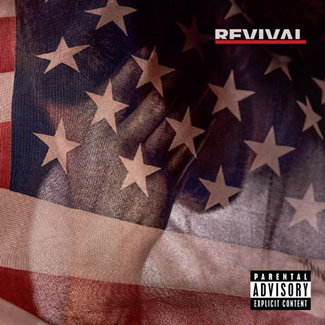REVIVAL by Eminem

Eminem – REVIVAL
Genre: Pop Rap
Favorite Tracks: “Walk On Water,” “Framed,” “Offended,” “Castle”
In the past decade or so, Eminem’s struggle between choosing to reinvent or to recreate himself has only intensified. His glory days are long behind him, and regardless of whether he’s accepted that or not, he’s been able to resist irrelevancy quite well thanks to his stans (all of his albums have charted at number one since THE MARSHALL MATHERS LP). With this toiling, though, has come an inevitable downturn in quality. His age is showing worse than ever and what’s most devastating is that we can hear it: the rap deity sounds like he’s trying. In his prime, we could enjoy the astute fluency in rhyme, the overall ease and steadiness, the words streaming out from his mouth, perfectly coalescing with each other as some kind of expert-level tetris verbiage. Now, however, the blocks are stacking up increasingly crudely, the gaps showing evermore.
There are those who defend his misfires, but you know they’re swallowing all the new material down with a hefty dose of everything that came before ENCORE. Why can’t Eminem, once the second coming of rap, redeem himself? His contemporaries have been able to manage just fine: despite the occasional flops in between, both Nas and Jay-Z obtained late-period second winds. Yet this middle-age grace is eluding Em. He has this need to try and produce a game-changer every time, when really, if he could just be content with an okay, or say, casual, album, he and the world would be better for it. A title like REVIVAL isn’t exactly a step in the right direction.
Eminem’s beast of a ninth album contains 19 tracks and clocks in at a whopping hour-and-17-minutes—nearly a full length movie. It’s a shame, then, that so much of it is asinine filler: “I got that air about me like wind chimes,” he raps on “Believe,” and on the following “Chloraseptic,” he lets out a doggerel like “ . . . put you in your place like a realtor.” In reference to a prostitute he plans on murdering: “I put an end to your life, sex crime”—that one’s not even clever, it’s just a literal definition of the occurrence. On “Remind Me” and “Heat,” we’re subjected to some of Eminem’s most cringe-worthy and corny explorations of love: “Your booty is heavy duty like diarrhea” and “ . . . computer lodged in her vagina . . . my dick is an Apple, she said put it inside her,” respectively. We’re quite privy to his psychopathic potty-mouth, and we’ve even cherished it in his juvenilia, but it’s hard to enjoy when formed through the angry, strained staccato of a 45-year-old, whose experience should yield finer witticisms than, “Don’t snap, it’s supposed to get grabbed / Why do you think they call it a snatch?”
Since much of the content is wreathed in such affected production, the heavy-handedness is emphasized. In his rise to rap phenom, Eminem kept his producing roster to a limited, proficient bunch; Dr. Dre and The Bass Brothers were mainstays of his work, endowing signature and cohesion without sacrificing thrill. Packed to the brim with producers of varying talent and experience, REVIVAL makes for a distended slog. Eminem’s questionable curating maroons Dre as a co-producer on a single 26-second intro, whereas Alex Da Kid’s highfalutin Top-40 leanings show up on three whole tracks. Rick Rubin is also back behind the boards, whose input does contain a sort of discerning frisson, but his rock underpinnings fail to mitigate the wizening flow of Eminem and his attempts to capture the lusty vim of his work with the Beastie Boys or Run DMC are bereft of any of the inspiration, creativity, or originality that propelled them to trailblazer status. “Remind Me” is Eminem merely rapping over the instrumental of Joan Jett’s “I Love Rock ‘n Roll” with few intricacies separating it from the original (the chorus is a butchered rework, more or less the same too), and the BOOGIE NIGHTS interpolation on “Heat” makes for an interesting sample but still feels perfunctory in execution.
Production aside, it’s the rehashed song subjects and structure that really mires the project, depleted of any of the atmosphere and cinematics his peak storytelling was made of. One can only brook the same stories of toxic, abusive relationships so many times, bound together by the same formula of salty and sour Eminem contrasting with honeyed vocals, usually by females. He employs the likes of past collaborators Pink and Skylar Grey on “Need Me” and “Tragic Endings,” both songs detailing acrimonious love. “Bad Husband” and “River” wade through the same bog—however, as to alleviate any tedium, the genders are switched up for the choruses. While X Ambassadors pester with their wannabe Imagine Dragons humming and howling on the former, it’s not as noxious as Ed Sheeran’s contribution on the latter. To have Eminem and Sheeran on the same track, one an iconoclast and the other a banal pop partisan, just feels like a betrayal of principle. It’s a mystery as to why he objected enlisting any of his legitimate rap contemporaries; while THE MARSHAL MATHERS LP 2 was a flop on most accounts, we got to witness a pupil, Kendrick Lamar, joining his mentor on “Love Game,” but here Em only lends the mic to newcomer Phresher, which is commendable in its charity, but amounts to a rather insubstantial hook: “Chloraseptic, ‘septic / And you got strep, I’m too complex with, ‘plex with / This shit I wrote is on some next shit, next shit / I’m at your throat, I’m feelin’ reckless . . .”
On his politically charged tracks, Eminem neglects that fact that another rapper’s perspective would have undoubtedly made for a fascinating dialogue. It’s a pleasure seeing him take on Donald Trump in the unite-and-stand anthem “Like Home,” but there’s a sense that a younger Em could’ve handled it with more tact and insight and less heroics, starting with the exclusion of a schmaltzy, flag-waving beat and Alicia Keys chorus. “Untouchable” is a scathing satire of police brutality and the second-rate footing of African-Americans in the US . . . on paper. It’s gauche and contrived in actual presentation: “Throughout history, African-Americans have been treated like shit / And I admit, there have been times where it’s been embarrassin’ to be a / White boy, white boy . . .” At one point he actually assumes the point of view of the oppressed race, and while the intention is good, there is an appropriative air to it all. In previous social and political commentaries like “The Way I Am” and “White America,” there was understood perspective and a balance of solemnity and levity, but Eminem’s approach here is totally bungled.
Buried under all of the effete, eye-rolling puns and wordplay, there’s still an extremely competent rapper in there. That Eminem can still punch out hours of material is a feat in its own right, and here and there we catch glimpses of all that was and still is. Tracks like “Offended” see him toying with some fun, nursery rhyme-fashioned hooks, and in its coda he unleashes a spitfire salvo of rhymes that only he could command. “Framed” is crafted with a horrorcore-type narrative and loopy production that harkens back to his murderous ravings on the SLIM SHADY LP. His mining introspection isn’t without a couple gems either. The penultimate song, “Castle,” has Eminem stepping back to take a look at his literal castle of wealth and fame he’s cultivated, lamenting the position he’s placed his daughter in; While we’re used to him hurling lyrical boulders at celebrities, family, or other rappers, on “Believe” he decides to take on his own fans, emphatically vowing to hold a grudge if they abandon him.
For someone with so much hard-earned fame and respect, insecurity still eats at Eminem and sometimes the pride-checking is overwhelming, almost becoming an obsession; have something you want to say? Don’t bother, because “In Your Head” covers nearly every inch of criticism: “Hailie, baby, I didn’t mean to make you eighty / Percent of what I rapped about,” or “Feel like a lame piece of shit, I sound cranky and bitter / Complain, beef and bicker ’bout the same things.” He always needs to be addressing his flaws and making it known that he knows what they are. He’s constantly wrestling with his identity and genius and a part of me appreciates the humility, but a part of me wants him to put it aside and take a breather.
Even so, he surprises with a certain vain ignorance on his grandest self-assessment yet, “Walk on Water,” entirely due to the closing line: “Bitch, I wrote Stan.” It’s the most telling moment on REVIVAL, and at the same time the saddest. His desperate reach for supreme self-effacing ends in a spectacular self-sabotage all because of that final statement; he may not even realize how pathetic he sounds holding on to that pièce de résistance, and in a genre where introspection tends to earn reverence, it’s Mather’s cluelessness that makes for one of rap’s most poignant and illuminating soliloquies. Maybe it’s in jest and he’s winking through it all and I’m the idiot here, but the context as a whole—spare beat, backgrounded pencil-scribbling and paper-crumpling, Beyonce as his auxiliary—suggests otherwise. It plays like a midlife crisis for Mathers, to retire or to reclaim, trying to convince himself that he is the greatest of all time, a thought slowly relegating from the rank of no-brainer to dubious. If “Castle” wins because of all that’s revealed with pure intention, than his obliviousness on “Walk on Water” gets points for accidentally revealing a tortured, complex, and maybe delusional psyche in stunning denial. In 2002, three insta-classics in, Eminem was nonpareil, standing alone as the king of hip hop. Forget being the greatest white rapper of all time, he was arguably the GOAT. Period. But the more he’s trucked along, the heavier the crown’s become. All that he is as Eminem, Slim Shady, Marshall Mathers, this cultural, musical, and yes, even political, entity is now stepping on his fingers as he clings to the tower he once peered over.
Verdict: Do Not Recommend



